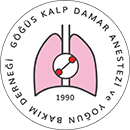

Koroner Arter Baypas Cerrahisi Sonrası Atriyal Fibrilasyon: Risk Faktörleri
Oya Karakaş1, Nurgül Yurtseven2, Dilek Savaskan21Sağlık Bilimleri Üniversitesi Yüksek İhtisas Eğitim ve Araştırma Hastanesi, Bursa2Sağlık Bilimleri Üniversitesi Dr. Si̇yami̇ Ersek Göğüs Kalp ve Damar Cerrahi̇si̇ Anestezi ve Reanimasyon Kliniği, İstanbul
GİRİŞ ve AMAÇ: Koroner arter baypas greft (KABG) cerrahisi sonrası görülen en sık ritm bozukluğu olan Atriyal Fibrilasyonda(AF), risk faktörlerini belirlemek ve C-Reaktif Protein (CRP) ile AF arasında bir korelasyon olup olmadığını göstermektir.
YÖNTEM ve GEREÇLER: Koroner arter cerrahisi yapılacak 250 hasta prospektif olarak çalışmaya alındı. Tüm hastaların demografik verileri, peroperatif ve postoperatif değişkenleri ve postoperatif 6.güne dek günlük CRP ve AF takipleri ile, AF olanların tedavi protokolleri kaydedildi.
BULGULAR: Takip edilen hastaların 43’ünde (%17.2) AF tespit edildi. Multivariate analizde, ileri yaş, hipertansiyon (HT) ve preoperatif kalsiyum kanal blokeri kullanma ile AF arasında anlamlı bir ilişki olduğu saptandı(p<0.05). CRP değerleri postoperatif 2. günde en yüksek değere ulaştı. AF bu dönemde 14 hastada görülmüş (%5,6) olmakla birlikte, CRP yüksekliği ile AF gelişimi arasında bir ilişki tespit edilemedi(p>0.05). AF gelişen hastaların yoğun bakım ve hastanede kalış sürelerinin istatistiksel olarak anlamlı uzun olduğu gözlendi(p<0.05).
TARTIŞMA ve SONUÇ: KABG operasyonu geçiren ileri yaştaki, hipertansif, preoperatif kalsiyum kanal blokeri kullanan hastalarda, AF gelişme riskinin daha fazla olduğu ve AF tespit edilen hastaların yoğun bakım ve hastanede kalış sürelerinin daha uzun olduğu tespit edilmiş ve AF ile CRP arasında bir korelasyon bulunamamıştır
Anahtar Kelimeler: Atrial Fibrilasyon, Koroner Cerrahisi, Risk Faktörleri
Atrial Fibrillation After Coronary Artery Bypass Surgery: Risk Factors
Oya Karakaş1, Nurgül Yurtseven2, Dilek Savaskan21Department of Yüksek İhtisas Training and Research Hospital, University of Healt Science, Bursa, Turkey2Department of Dr. Siyami Ersek Thoracic Cardiovascular Surgery Training and Research Hospital, University of Healt Science, Istanbul, Turkeyl
INTRODUCTION: The aim of this study was to determine the risk factors in Atrial Fibrillation (AF), which is the most common rhythm disorder observed after coronary artery bypass graft (CABG) surgery, and to show whether there is a correlation between C-Reactive Protein (CRP) and AF.
METHODS: 250 patients who underwent coronary artery surgery were prospectively included in the study. Demographic data, peroperative and postoperative variables of all patients, daily CRP and AF follow-ups until the 6th postoperative day and treatment protocols of AF patients were recorded.
RESULTS: AF was detected in 43 (17.2%) of the patients who were followed up. It was found that there was a statistically significant relationship in the multivariate analysis between advanced age, hypertension (HT) and use of preoperative calcium channel blocker and AF(p<0.05). CRP values reached the highest value on the 2nd postoperative day. Although AF was seen in 14 patients (5.6%) in this period, no relation was found between the height of CRP and the development of AF(p>0.05). It was observed that the duration of intensive care and hospital stay of patients with AF was statistically significantly longer (p <0.05).
DISCUSSION AND CONCLUSION: It was found that patients with advanced age, hypertensive, preoperative calcium channel blocker usage had a higher risk of developing AF. Duration of ICU and hospital stay was longer, and no correlation was found between AF and CRP.
Keywords: Atrial Fibrillation, Coronary Surgery, Risk Factors
Makale Dili: Türkçe
(1800 kere indirildi)

















